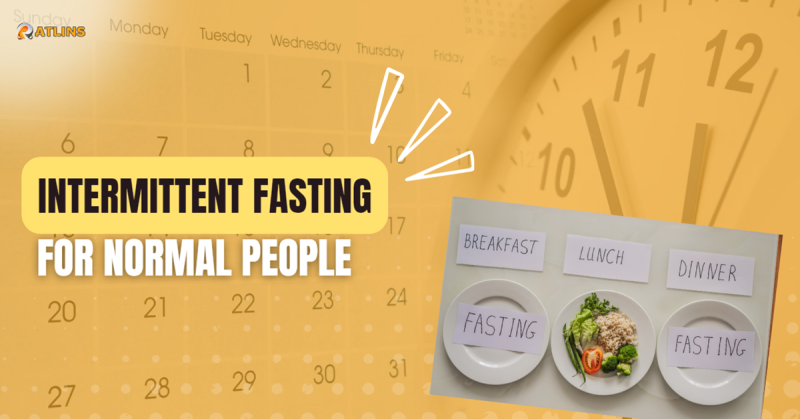You are here because you want to lose some weight like a normal person, right? If you are too busy or too lazy to exercise, then you are on the right track to learn how to lose weight by eating with time and self-discipline. If you are looking for a simple and effective way to lose weight, improve your health, and simplify your lifestyle, you may want to consider intermittent fasting. Intermittent fasting (IF) is a popular eating pattern that involves alternating periods of fasting and eating. Unlike most diets, IF does not tell you what to eat, but when to eat.
In this article, we will explain what intermittent fasting is, why you should try it, and how to do it in a realistic and manageable way. We will also discuss the advantages and disadvantages of IF and some tips and tricks to make it easier for you.
What is intermittent fasting?
Intermittent fasting is a term that covers various methods of fasting, such as:
- Alternate-day fasting. You eat normally one day and fast (or eat very little) the next.
- 5:2 fasting. You eat normally five days a week and fast (or eat very little) two days a week.
- Time-restricted feeding. You eat only within a certain window of time each day, such as 8, 10, or 12 hours.
The most common and popular method of IF is the 16/8 method, where you fast for 16 hours and eat within an 8-hour window. For example, you may skip breakfast and eat your first meal at noon and your last meal at 8 p.m.
The idea behind IF is that by limiting your eating time, you reduce your calorie intake and give your body a chance to burn fat and repair itself. IF can also help regulate your hormones, such as insulin, ghrelin, and leptin, which affect your appetite, metabolism, and fat storage.
Why should you try intermittent fasting?
Intermittent fasting has many benefits for your health and well-being, such as:
- Weight loss. IF can help you lose weight by creating a calorie deficit and boosting your metabolism. IF can also help you preserve your muscle mass and lose more fat, especially from your belly area.
- Metabolic health. IF can improve your blood sugar, cholesterol, and blood pressure levels, which can lower your risk of diabetes, heart disease, and stroke.
- Inflammation. IF can reduce inflammation, which is linked to many chronic diseases such as Alzheimer’s, arthritis, asthma, and cancer.
- Longevity. IF can activate a process called autophagy, which is the natural cleaning and recycling of your cells. This can help prevent aging, disease, and cell damage.
- Brain health. IF can enhance your cognitive function, memory, mood, and creativity. IF can also protect your brain from neurodegenerative disorders, such as Parkinson’s and Alzheimer’s.
How do you do intermittent fasting in a realistic and manageable way?
Intermittent fasting may sound simple, but it can be challenging, especially in the beginning. You may experience hunger, fatigue, irritability, and stress while you adjust to your new eating schedule. Here are some tips to make IF easier for you:
Start with a modified schedule.

You don’t have to jump into a 16/8 or a 5:2 right away. You can start with a shorter fasting window, such as 10 or 12 hours, and gradually increase it as you get used to it. You can also choose the days and times that work best for you and your lifestyle.
Stay well-hydrated.

You should drink plenty of water and other non-caloric fluids, such as herbal teas, black coffee, and diet drinks, during your fasting period. This can help you stay hydrated, flush out toxins, and suppress your appetite.
Eat nutritious and satisfying foods.

You should eat a balanced and healthy diet that includes plenty of protein, fiber, healthy fats, and micronutrients. These foods can help you feel full and nourished and prevent nutrient deficiencies. You should also avoid or limit processed foods, added sugars, and alcohol, as they can spike your blood sugar, increase your inflammation, and interfere with your fasting benefits.
Exercise moderately.

You can do some physical activity during your fasting period, such as walking, jogging, biking, or swimming. This can help you burn more calories and fat, improve your mood and energy, and lower your blood sugar. However, you should avoid intense or prolonged exercise, as it can cause dehydration, muscle loss, and hypoglycemia. You should also listen to your body and stop if you feel dizzy, weak, or nauseous.
Get enough sleep.

You should aim for at least 7 to 9 hours of quality sleep per night, as sleep is essential for your health and weight loss. Lack of sleep can disrupt your hormones, increase your appetite, lower your metabolism, and impair your cognitive function. To improve your sleep, you should avoid caffeine, alcohol, and screen time before bed and follow a regular sleep schedule.
Advantages and disadvantages of intermittent fasting
Intermittent fasting has many advantages, but it also has some disadvantages that you should be aware of. Here are some of the pros and cons of IF:
Advantages:
- IF is simple and flexible. You don’t have to count calories, measure portions, or follow a strict meal plan. You can choose the fasting method, duration, and frequency that suit you and your goals.
- IF is effective and sustainable. You can lose weight and improve your health without feeling deprived or hungry. You can also enjoy your favorite foods and social occasions without guilt or stress.
- IF is beneficial for your body and mind. You can prevent or reverse many chronic diseases, enhance your brain function, and extend your lifespan.
Disadvantages:
- IF can be hard and unpleasant. You may experience physical and psychological discomfort, such as hunger, fatigue, headaches, mood swings, and cravings. You may also face social pressure or criticism from your family, friends, or coworkers.
- IF can be risky and unsafe. You may develop nutritional deficiencies, hormonal imbalances, or metabolic disorders if you fast too long or too often. You may also worsen your existing medical conditions or interfere with your medications if you fast without consulting your doctor.
- IF can be addictive and obsessive. You may develop an unhealthy relationship with food and your body, such as binge eating, orthorexia, or anorexia. You may also neglect other aspects of your health and well-being, such as your mental, emotional, and social needs.
Conclusion
Intermittent fasting is a powerful and popular eating pattern that can help you lose weight, improve your health, and simplify your lifestyle. However, it is not a magic bullet or a one-size-fits-all solution. You should do your research, consult your doctor, and find the best way to do it that works for you and your goals. You should also be mindful of the potential benefits and risks of IF and balance your fasting with your feeding, your exercise with your rest, and your body with your mind.





